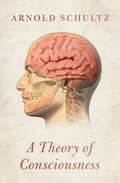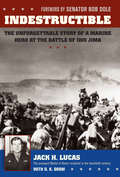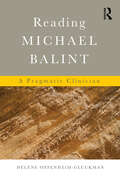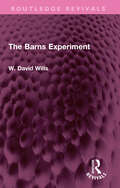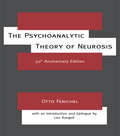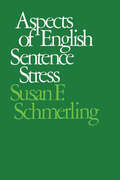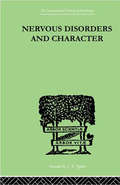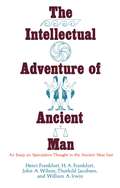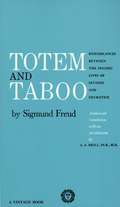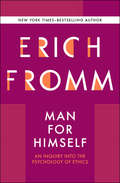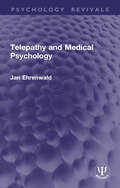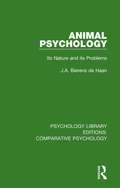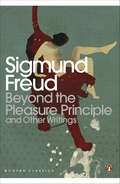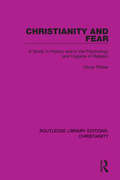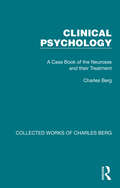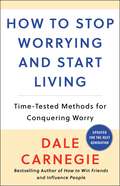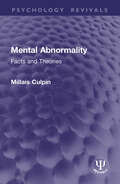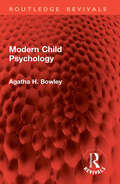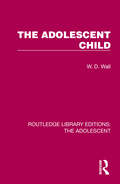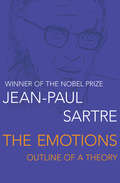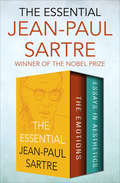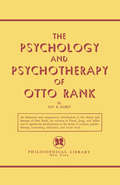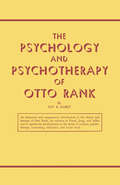- Table View
- List View
A Theory of Consciousness
by Arnold SchultzAn examination of the underpinning of philosophical thought—consciousness—through a study of the physiology of the central nervous system. Philosophy begins with an acknowledgment of consciousness as an internal experience. Many renowned thinkers—from Descartes (&“I think, therefore I am&”) to John Dewey and his theory of inquiry—assume without further ado that consciousness is necessary to experience. Famous philosophies have been founded on the choice of a mode of thought and its consistent use. A Theory of Consciousness maintains that there are a number of different types of thinking which lead to a variety of logical results; that everyone is capable of following these differing schools of thought, though usually favoring by habit one more than another; and that everyone trusts the results of a particular coordination while employing it and often while following it in the expression of another thinker. Author Arnold Schultz maintains that before these various modes of thought can be considered, it is necessary to explain the phenomenon of consciousness in terms of the energies of the central nervous system. In this work, Schultz covers such subjects as: direct versus reflective consciousness, bodily awareness, logic and mathematics, kinesthetic and ontic sensations, affectation, passive and active referral, and more.
Indestructible: The Unforgettable Story of a Marine Hero at Iwo Jima
by Jack Lucas D. K. DrumDuring the battle of Iwo Jima, two enemy grenades landed close to Jack Lucas and his buddies. Jack threw himself on one of the grenades, grabbed the second, and pulled it beneath his body. His buddies were saved, but Lucas was badly injured. Miraculously, he survived-but just barely. For this brave action seventeen-year-old Jack Lucas from North Carolina became the youngest Marine in history to receive the Medal of Honor. Indestructible reveals the rocky road that led Jack Lucas to Iwo Jima, his arduous recovery, and the obstacles Jack overcame later in life. Jack’s moving and powerful memoir is a testament to America’s greatest generation.
Reading Michael Balint: A Pragmatic Clinician (Routledge International Handbooks Ser.)
by Helene Oppenheim-GluckmanMichael Balint is above all known for the "Balint Groups", which came to be a generic term for groups involved with the training of doctors and caregivers in the patient-caregiver relationship. Despite this, the origin and full import of his work has been somewhat overlooked. Hélène Oppenheim-Gluckman provides us with a concise account of how reading Balint has enriched psychoanalytic theory and its practice by broadening the indications for the psychoanalytic cure and the debate on psychotherapies and the training to the professional care-giver-patient relation. Reading Michael Balint: A pragmatic clinician shows how Balint must be considered as one of the major figures in the British Independent School of psychoanalysis, along with Winnicott and Fairbairn. Oppenheim-Gluckman argues that his ideas, and the implications of his work with groups of medical practitioners, have remained hugely influential within modern psychoanalysis and training in medical psychology. Reading Michael Balint presents a clear overview of the main tenets of his work. It provides a fresh perspective on Balint’s contribution and its importance for modern object relations theory and practice and brief psychotherapy. It will be an invaluable resource for psychoanalysts, psychoanalytic psychotherapists, counsellors and trainee psychoanalysts and doctors. Hélène Oppenheim-Gluckman is a psychiatrist and psychoanalyst, and has a doctorate in fundamental psychopathology and practises in Paris. She is a member of the Société de Psychanalyse Freudienne, the Société Médicale Balint, and a Balint Group "leader". She has published several books and a number of articles in psychoanalytic, medical, psychiatric and political-cultural journals.
The Barns Experiment (Routledge Revivals)
by W. David WillsOriginally published in 1945, this is a concise account of the remarkable experiment with boys carried out by the author of The Hawkspur Experiment. The war put this latter experiment into abeyance, but gave its author an opportunity to practice his principles on a group of younger difficult boys. Aged from eight to fourteen, these boys were the "throw-outs" of the Evacuation Scheme, but before the Barns experiment had been long in operation troublesome boys were being evacuated not primarily to escape bombs, but in order that they might have the treatment that Barns provided. Barns was a Hostel-school initiated by the Society of Friends, where lawless boys made their own laws, and where the principle instrument in their reformation was not punishment but affection. So successful were the unconventional methods here described that sceptics were convinced, and Barns has now achieved a permanent place in the field of "the therapy of the dis-social." Today it would be described as a therapeutic community and is one of the earliest experiments of its kind that raised awareness and paved the way for further research in this area.
The Psychoanalytic Theory of Neurosis (International Library Of Psychology Ser.)
by Otto FenichelThe Psychoanalytic Theory of Neurosis, Fenichel's classic text, summarized the first half century of psychoanalytic investigation into psychopathology and presented a general psychoanalytic theory of neurosis. When Otto Fenichel died, Anna Freud mourned the loss of 'his inexhaustible knowledge of psychoanalysis and his inimitable way of organizing and presenting his facts'. These qualities shine through The Psychoanalytic Theory of Neurosis which has been a standard reference for generations of psychoanalysts. For this anniversary edition, Leo Rangell has written an introduction that sets Fenichel's work in context. He sees Fenichel as a worthy heir to Freud; both men influenced their followers by what Rangell calls 'the charisma of ideas'. In his epilogue, Rangell describes the fate of Fenichel's ideas and of this book as 'a barometer of the place of psychoanalysis ... within the external intellectual world and, even more significantly, of the trends and shifting winds of opinion within the psychoanalytic field itself'. He traces those trends through the turbulent controversies of the field, concluding that Fenichel's observations are as fresh and relevant today as they were fifty years ago.
Aspects of English Sentence Stress
by Susan F. SchmerlingAspects of English Sentence Stress is written within the conceptual framework of generative-transformational grammar. However, it is atheoretical in the sense that the proposals made cannot be formulated in this theory and are a challenge to many other theories. The author's concern is not with the phonetic nature of stress; rather, using a working definition of stress as subjective impression of prominence, she attempts to formulate general principles that will predict the relative prominence of different words in particular utterances-what might be called the syntax of stress. She supports her arguments with a large amount of original data and provides the basis for new ways of thinking about this area of linguistic research. Schmerling begins with a detailed review and critique of Noam Chomsky and Morris Halle's approach to sentence stress; she shows that their cyclic analysis cannot be considered valid, even for quite simple phrases and sentences. Next, she reviews discussions of sentence stress by Joan Bresnan, George Lakoff, and Dwight Bolinger, agreeing with Bolinger's contention that there is no intimate connection between sentence stress and syntactic structure but showing that his counterproposal to the standard approach is inadequate as well. She also examines the concept of "normal stress" and demonstrates that no linguistically significant distinction can be drawn between "normal" and "special" stress contours. In generating her own proposals concerning sentence stress, Professor Schmerling takes the view that certain items which are stressable are taken for granted by the speaker and are eliminated from consideration by the principles governing relative prominence of words in a sentence. Then she examines the pragmatic and phonological principles pertaining to items that are not eliminated from consideration. Finally, the author contends that the standard views, which she shows to be untenable, are a result of the assumption that linguistic entities should be studied apart from questions concerning their use, in that it was adoption of this methodological assumption that forced linguists to deny the essentially pragmatic nature of sentence stress. Accessible to anyone who is familiar with the basic concepts of generative-transformational grammar, Aspects of English Sentence Stress presents provocative ideas in the field.
Nervous Disorders And Character: A Study in Pastoral Psychology and Psychotherapy (International Library Of Psychology Ser.)
by McKENZIE, John GFirst published in 1999. Routledge is an imprint of Taylor & Francis, an informa company.
The Intellectual Adventure of Ancient Man: An Essay on Speculative Thought in the Ancient Near East
by John A. Wilson Henri Frankfort H. A. Frankfort Thorkild Jacobsen William A. IrwinThe people in ancient times the phenomenal world was teeming with life; the thunderclap, the sudden shadow, the unknown and eerie clearing in the wood, all were living things. This unabridged edition traces the fascinating history of thought from the pre-scientific, personal concept of a "humanized" world to the achievement of detached intellectual reasoning. The authors describe and analyze the spiritual life of three ancient civilizations: the Egyptians, whose thinking was profoundly influenced by the daily rebirth of the sun and the annual rebirth of the Nile; the Mesopotamians, who believed the stars, moon, and stones were all citizens of a cosmic state; and the Hebrews, who transcended prevailing mythopoeic thought with their cosmogony of the will of God. In the concluding chapter the Frankforts show that the Greeks, with their intellectual courage, were the first culture to discover a realm of speculative thought in which myth was overcome.
Totem and Taboo: Resemblances Between the Psychic Lives of Savages and Neurotics
by Sigmund FreudReprints a translation by A. A. Brill, which was originally published in 1918 (Dodd, Mead & Company). Freud's classic work applies psychoanalysis to aboriginals, paralleling aboriginal practice and neurotic patterns of behavior. For example, Freud compares aboriginal incest taboos with scrupulous rituals of compulsion neurotics who, Freud finds, also wrestle with incest taboos. Culture is itself theorized as a reaction-formation to taboos prohibiting potentially destructive social behavior. Annotation c. Book News, Inc. , Portland, OR (booknews. com)
Man for Himself: An Inquiry Into the Psychology of Ethics (Routledge Classics Ser.)
by Erich Fromm&“There is no meaning to life except the meaning man gives his life by the unfolding of his powers.&” —Erich FrommAre we primarily determined by nature or nurture? What are the best ways that people can live productively? In Man for Himself, renowned social philosopher Erich Fromm posits: With the gifts of self-consciousness and imagination, any individual can give his or her own unique answer. This answer is rooted in our human nature, and should correspond to mankind&’s powers of reason and love. Therefore, Fromm reasons, &“living itself is an art.&” In his humanistic concept of man, Fromm describes various character orientations that are to be found in Western culture. For the first time, Fromm analyzes the parallels between economic concepts of market value and how we value others and ourselves—the idea of personality as a commodity. He argues for a return to humanistic ethics, and discusses issues such as the question of conscience, of selfishness and self-love, and of pleasure and happiness. This ebook features an illustrated biography of Erich Fromm including rare images and never-before-seen documents from the author&’s estate.
Telepathy and Medical Psychology (Psychology Revivals)
by Jan EhrenwaldFirst published in 1947, the original blurb for Telepathy and Medical Psychology reads: ‘An increasing mass of evidence compiled during the past years has made the occurrence of telepathy and related phenomena an established fact. However, contemporary medical psychology has refused so far to acknowledge their existence and to reconcile them with their systems of thought. Dr Ehrenwald’s book is the first serious attempt in this direction. He shows that telepathy is subject to much the same psychological laws as govern dreams, neurotic symptoms and certain manifestations of mental disease. His approach moves largely along the lines of the psychoanalyst, but his conclusions are likely to shake some of the basic propositions of psychoanalysis itself. At the same time they throw fresh light on certain aberrations of character and personality and his new interpretation of paranoia and related disorders may well mark a turning point in modern psychopathology and psychiatry.Dr Ehrenwald writes his book not only for the medical psychologist: the problems discussed called for the attention of a wider public and his way of presentation makes it fascinating reading for the educated layman.’ Today it can be read in its historical context.
Animal Psychology: Its Nature and its Problems (Psychology Library Editions: Comparative Psychology)
by J.A. Bierens de HaanOriginally published in 1948, the author follows the idea that the instincts are "the spring and basis of all animal behaviour (with the exception perhaps of play), and therewith the core of the animal’s mind, and that individual experience, gathered by the animal in the course of its life, may influence and reconstruct these instincts, so as to guide, in the form of intelligence and understanding, this behaviour along new (i.e. innate) paths. Thus, instinct and experience become the pillars upon which animal behaviour is built up; instinct, intelligence, and understanding form a triad round which the facts of the psychology of animals may be grouped. As a foundation of all this the author first tries to prove the good right of a real and genuine animal psychology, not hampered by objectivistic and behaviouristic scruples, while in a final chapter, by way of conclusion, he tries to give an image of how the world of the animal is built up."
Beyond the Pleasure Principle (Penguin Modern Classics)
by Sigmund FreudA collection of some of Freud's most famous essays, including ON THE INTRODUCTION OF NARCISSISM; REMEMBERING, REPEATING AND WORKING THROUGH; BEYOND THE PLEASURE PRINCIPLE; THE EGO AND THE ID and INHIBITION, SYMPTOM AND FEAR.
Christianity and Fear: A Study in History and in the Psychology and Hygiene of Religion
by Oscar PfisterOriginally published in 1948, Christianity and Fear explores the nature and history of Christian love in relation to the problem of fear. Based on methods of depth psychology and mental hygiene, the book argues for the necessity of a general concentration of the Christian religion and way of life upon the unity of love through faith and faith through love. It presents the struggle between the teaching of Christian love and the many instances of disputes on dogma that have prompted hatred and fear throughout ecclesiastical history. By using the theory of fear and compulsions, it attempts to explain the directions assumed by these aberrations in Christian history and to highlight love as the essence of the teaching of Jesus. Christianity and Fear will appeal to those with an interest in the history of Christianity, theology, and the psychology of religion.
Clinical Psychology: A Case Book of the Neuroses and their Treatment (Collected Works of Charles Berg)
by Charles BergOriginally published in 1948 the blurb read: 'Dr Berg has an extraordinary flair for presenting a difficult subject in a most realistic and attractive manner, without sacrifice of scientific essentials. The patients are made to speak for themselves, with the result that we feel actually present at the analytical sessions, sharing the most intimate details of each individual’s life and feelings. Throughout it is alive with real, vivid clinical material. The reader is led through a panorama of troubled minds and disturbed emotions – from the simplest worries and anxieties, through increasing severity of stresses, to incipient major disorders. The whole subject of treatment is reviewed and expounded in compendious detail, concluding with a critical review and revolutionary suggestions for the future. In spite of its novel and entertaining method of exposition, the book covers a surprisingly wide field – the whole field of clinical psychology up to date – and more.' Today it can be read and enjoyed in its historical context. This book is a re-issue originally published in 1948. The language used is a reflection of its era and no offence is meant by the Publishers to any reader by this re-publication.
How to Stop Worrying and Start Living: Time-Tested Methods for Conquering Worry (Dale Carnegie Books)
by Dale CarnegieWith Dale Carnegie&’s expert advice, you&’ll learn the proven, time-tested principles to breaking free of worry and anxiety so that you can start living your best life today.Thanks to Dale Carnegie&’s classic work of practical advice, more than six million people have already discovered happier, more fulfilling lives. How to Stop Worrying and Start Living has also never been more relevant—particularly since it has been updated for the first time in forty years. In this indispensable guide, you&’ll discover how to: - Quickly pinpoint solutions to any problem that can be put into action right away - Worry less about business and finances - Sleep better and feel refreshed each day - Gain appreciation and gratitude - Stop getting stuck on criticism Fascinating to read and easy to apply, this brilliant book cuts to the heart of your most fundamental emotions and provides lasting relief to your worry and anxiety. As millions of others have done, use it to discover your own prosperous, complete, and happy life.
Mental Abnormality: Facts and Theories (Psychology Revivals)
by Millais CulpinFirst published in 1948, Mental Abnormality: Facts and Theories was written when great changes were taking place in the handling of mental disorders and in the teaching of the subject in medical schools. Knowledge of this progress reached the public in a scrappy and sometimes misleading form, and the author felt that people had as much right to know about it as about advances in the more physical side of medicine. This book gives an outline of the many and often unsuspected ways in which so called ‘mental abnormality’ could manifest itself, together with an account of developments both in theory and treatment at the time. Today it can be read in its historical context.This book is a re-issue originally published in 1948. The language used and views portrayed are a reflection of its era and no offence is meant by the Publishers to any reader by this re-publication.
Modern Child Psychology (Routledge Revivals)
by Agatha H. BowleyFirst published in 1948, Modern Child Psychology intends to give a summarised account of the most important work on child psychology back in the 1940s. A vast amount of careful research on the problems and the progress of development has been undertaken and much valuable data obtained. Agatha Bowley has attempted to outline in non-technical language the most important findings of the psychoanalytic school. The discoveries of psychoanalysis have had far reaching and revolutionary effects on our methods of bringing up children. Probably the contributions of Freudian psychology have done more to change the outlook of child psychology than any other school of thought.This important historical reference work will be of interest to students of developmental psychology, child psychology and psychology in general.
Small Bites: Mindfulness for Everyday Use
by Annabelle ZinserDrawing on her experiences as a Buddhist teacher in the tradition of Thich Nhat Hanh, Annabelle Zinser developed meditation and mindfulness practices for a variety of everyday situations and the transformation of emotional challenges. In short chapters the author demonstrates how to connect the awareness of our breath with focusing our mindfulness on a particular topic at hand, such as: dealing with inferiority complex; recognizing negative thoughts and emotions; taking care of our sexuality; seeing our ancestors within us. This puts us in touch with the healing capacity of the present moment, and gives us a tool to transform even the most difficult and painful aspects of our lives into something joyful and healing. In their simplicity, the meditations follow the model of Metta meditation, aiming for the cultivation of our hearts and spirits. They always begin with focusing on the breath but from there expand to addressing a broad spectrum of mental conditions and life situations.Written for anyone aiming to living in a more grounded and sustainable way, Small Bites offers immediately applicable guidance in applying key mindfulness practices to daily life.
The Adolescent Child (Routledge Library Editions: The Adolescent)
by W. D. WallOriginally published in 1948, The Adolescent Child provided vital information on adolescence for parents, teachers, club leaders, social and religious workers and welfare supervisors in factories at the time. With research from both the UK and the US the author looks at the psychology of the adolescent through the many stages they encounter, from physical and emotional changes; self-identity; love and friendship to education and work. Today it can be read and enjoyed in its historical context.
The Emotions: Outline of a Theory
by Jean-Paul SartreOne of the leading twentieth-century French existentialist philosophers examines how human emotions shape our existence. In The Emotions: Outline of a Theory, French philosopher Jean-Paul Sartre attempts to understand the role emotions play in the human psyche. Sartre analyzes fear, lust, anguish, and melancholy while asserting that human beings begin to develop emotional capabilities from a very early age, which helps them identify and understand the emotions&’ names and qualities later in life. Helping to complete the circle of Sartre&’s many theories on existentialism, this vital piece of literature is a must-have for the philosopher-in-training&’s collection.
The Emotions: Outline of a Theory
by Jean-Paul SartreOne of the leading twentieth-century French existentialist philosophers examines how human emotions shape our existence. In The Emotions: Outline of a Theory, French philosopher Jean-Paul Sartre attempts to understand the role emotions play in the human psyche. Sartre analyzes fear, lust, anguish, and melancholy while asserting that human beings begin to develop emotional capabilities from a very early age, which helps them identify and understand the emotions&’ names and qualities later in life. Helping to complete the circle of Sartre&’s many theories on existentialism, this vital piece of literature is a must-have for the philosopher-in-training&’s collection.
The Essential Jean-Paul Sartre: The Emotions and Essays in Aesthetics
by Jean-Paul SartreThe renowned French philosopher lays the foundation for an Existentialist approach to psychology and aesthetics in this pair of classic works. In The Emotions: Outline of a Theory, Jean-Paul Sartre explores the role of emotions in the human psyche, presenting a phenomenological approach to psychology. Analyzing the universal, yet subjective, experiences of fear, lust, anguish, and melancholy, Sartre asserts that human beings develop their emotional capabilities from a very early age, which helps them identify and understand the names and qualities of their feelings later in life. Essays in Aesthetics is a provocative collection that explores the nature of art and its meaning. Sartre considers the artist&’s &“function,&” and the relation between art and the human condition. Engaging with the works of Tintoretto, Calder, Lapoujade, Titian, Raphael, and Michaelangelo, Sartre offers a fascinating analysis of the creative process. The result is a vibrant manifesto of existentialist aesthetics.
The Psychology and Psychotherapy of Otto Rank
by Fay B. KarpfOtto Rank, an Austrian psychologist, was a protégé of Sigmund Freud who saw in young Rank a gifted mind and drew him into his inner circle. The Psychology and Psychotherapy of Otto Rank is author Fay B. Karpf's historical and comparative introduction to the theory and therapy of Otto Rank, his relation to Freud, Jung, and Adler, and to significant developments in the fields of analysis, psychotherapy, counseling, education, and social work.
The Psychology and Psychotherapy of Otto Rank: Science And Philosophy, The Psychology And Psychotherapy Of Otto Rank, And Dictionary Of Hypnosis
by Fay B. KarpfThis authoritative study of psychologist Otto Rank covers his groundbreaking work, as well as his connections to Freud, Jung, and others. Austrian psychologist Otto Rank is one of the most influential figures in modern psychotherapy. A protégé́ of Sigmund Freud, he made significant developments in the fields of analysis, psychotherapy, counseling, education, and social work. In The Psychology and Psychotherapy of Otto Rank, social psychologist Fay B. Karpf—who studied with Rank—presents an authoritative analysis of his pioneering work. This historical and comparative introduction to Rank&’s theory and therapy explores his prolific writings, his work with patients, and his relation to Freud and Jung, as well as Alfred Adler and other major figures of the Neo-Freudian school.
